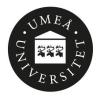

Umeå Universtity
We study fairness and find that it is not value-free, as it has serious implications in terms of who will be affected by a fairness intervention.

The work focuses on the choice between in-processing and post-processing showing that it is not value-free, as it has serious implications in terms of who will be affected by a fairness intervention. The work suggests how the translation of technical engineering questions into ethical decisions can concretely contribute to the design of fair models and the societal discussions around it.
The results of the experimental study provide evidences that are robust w.r.t. different implementations and discuss it for the case of a credit risk application. The results demonstrate how the translation of technical engineering questions into ethical decisions can concretely contribute to the design of fair models. At the same time, assessing the impacts of the resulting classification can have implications for the specific context of the original problem.
Output
Paper: That addresses the difference between in-vs-post processing methods on ML models focusing on fairness vs performance trade-offs.
This Humane-AI-Net micro-project was carried out by ING Groep NV (Dilhan Thilakarathne) and Umeå University (UMU, Andrea Aler Tubella).

